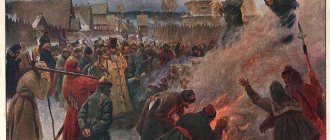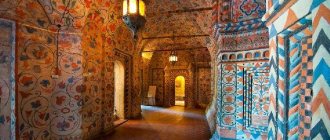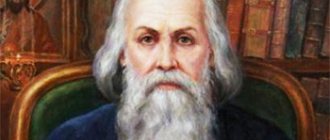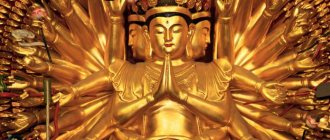At the beginning of March 1757, a scandal occurred in the building of the St. Petersburg Academy of Sciences. A group of bishops, representatives of the Holy Synod, had to quickly run away and jump over puddles, like frightened boys. And at their back, a large man with a round purple face shouted long obscene expressions and menacingly waved a cane with a gold head. This man was the great Russian scientist Mikhail Vasilyevich Lomonosov.
Why did Christian Lomonosov conflict with the church?
Mikhail Lomonosov did not have much reverence for religion. Although he believed in God. But he regularly had difficulties with church leaders, especially with the Holy Synod of the Orthodox Church. Although in his odes and poems dedicated to high-ranking persons, he glorified them, among other accomplishments, for showing concern for the Orthodox faith and the church. Why did the church not please the great scientist?
Free from birth
The first mention of the attitude of young Lomonosov to the church comes in 1728, when, according to confessional books, his parents were at confession, and their 17-year-old son Mikhailo avoided it “out of negligence.” And in the future he continued to “not please.” In his essay “On the Layers of the Earth,” the scientist explored the continuous variability of the physical state of the planet. He wrote, in particular: “We must firmly remember that visible bodily things on earth and the whole world were not in the same state from the beginning from creation as we now find, but great changes took place in it... So, in vain many people think that everything as we see, it was first created by the Creator... Such reasoning is very harmful to the growth of all sciences, consequently, to the natural knowledge of the globe, and especially to the art of mining, although it is easy for these clever people to be philosophers, having learned three words by heart: God created this way, and this in response instead of all reasons.” This quote reveals a free and new for that time attitude towards the physical appearance of the world. Lomonosov seemed to suggest to the church not to stand in the way of science when he wrote about the structure of matter, that “nature firmly adheres to its laws and is the same everywhere,” that one should “establish a theory from observations, and correct observations through theory.” However, the scientist did not fundamentally reject faith in God. He argued that scientific “truth and faith are two sisters, daughters of one higher parent,” they “can never come into conflict with each other.” In another essay, he wrote that “a mathematician is not sane if he wants to measure the divine will with a compass.” But so is “a theology teacher if he thinks that one can learn astronomy and chemistry from the psalter.” Mikhail Vasilyevich was not a rabid critic of the church. He did not seek to fight with the clergy. However, persecution began against the scientist from the spiritual department, the Synod.
M.V. Lomonosov about fasting and breaking the fast
Two and a half centuries ago, the great Russian scientist and writer Mikhailo Lomonosov expressed his thoughts on this matter in a letter to Count Shuvalov. Here are some excerpts.
The Holy Resurrection of Christ, the general Christian joy, is approaching; then, although the Passion of the Lord is read almost incessantly and repeated many times, our thoughts are already on Holy Week. Some people imagine pleasant and light meals, others think whether their dress will be in time for the holiday, others imagine how they will have fun with relatives and friends, others cook picturesque eggs and undoubtedly dream of kissing beauties or having a nicer date.
Finally, Matins began at midnight and mass was sung until daylight. Christ is Risen! only in the ears and on the tongue, but in the heart what place is there for Him, where the smallest wells are all filled with worldly desires. Like unleashed dogs, like accumulated water from an open dam, like whirlwinds bursting from a cloud, they tear, break, knock down, refute, torment. There are broken parts of various meats scattered there, broken dishes, spilled drinks are flowing, there lie unconscious people weighed down by gluttony and drunkenness, there lie naked and tired of fornication recent strict fasters.
Meanwhile, the poor stomach, having become accustomed for a long time to foods of little nutrition, is suddenly forced to accept fat and strong food into the contracted and weakened passages and, not having the required content of life juices, it sends uncooked poisons through the veins, they spiral, the flow of blood is stopped, and the soul is in The heavenly doors that were then opened fly straight out of the tightness of the body.
Mikhailo Vasilievich also draws attention to
the beginning of spring, when all the bad things accumulated from people and from other animals, which were imprisoned from frost all winter, are suddenly released and fill the air, mixed with water and us with phlegm and scurvy fish in the stomach, in the lungs, in the blood, in the nerves and they flow into the entire structure of the vital members of the human body, giving birth to diseases in the healthy, multiplying them in the sick and hastening death in those who could still live longer.
It is an indisputable fact that the unequal course of life and the abruptly alternating nutrition of the body is not only harmful to a person, but also fatal, so that the above-mentioned strict fasters, moreover, zealous and zealous lovers of holidays, can be considered suicides.
Next, M.V. Lomonosov addresses the Fathers and Teachers of the Church:
I turn to you, great teachers and organizers of fasts and holidays, and with all reverence I ask your holiness: what did you think about us at that time when St. Lent began at this time. It seems to me that you, in your holiness, meekness, patience and uprightness, will give a merciful answer -
and on their behalf he seems to give the answer:
You will say: “With fasts and holidays, we lived in Greece and in the Promised Land. It was then established to maintain the Holy Pentecost when, with the full radiance of the spring sun, the rich bowels of the earth open up, sprout young greenery filled with healthy juices and renew the air with fragrant perfumes; Our singing for the praise of God would correspond to murmuring streams, rustling leaves and sweet-voiced birds singing. - And about your midnight sides, we reasoned that not only there is not and will not be a Christian law, but below a single verbal inhabitant for the sake of the great cold. Don't complain about us! How would we order you to eat dates and figs and drink good grape wine according to krasoula, if they are not born to you? Arrange, like reasonable people, according to your climate, use the best time for fasting, or in bad times, use moderately healthy foods. You have clergy who have equal power from Christ to bind and decide. For such an important matter, an Ecumenical Council can be formed in Russia: preserving the lives of only a great many people is worth it. And besides, through teaching, instill in everyone the idea that it is more pleasing to God when we have a clear conscience in our hearts than in our stomachs when we have scurvy fish, that fasts were established not for suicide with unhealthy foods, but for abstaining from excess.”
Source: outlines of the treatise “On the preservation and reproduction of the Russian people.”
Passion for the heliocentric system
The reason for the start of this conflict was Lomonosov’s defense of the heliocentric system, accepted by leading scientists throughout Europe and already known in Russia. In the ode “Morning Reflection on the Majesty of God,” the poet gives a description of the photosphere of the Sun, which corresponds to modern scientific ideas: There the fiery shafts strive and do not find shores; There fiery whirlwinds spin, Fighting for many centuries; There the stones boil like water, the burning rains there make noise. In this greatness of a natural phenomenon, Lomonosov saw the power of God, before Whom even the bulk of the sun is a small spark. The study of nature filled the scientist and poet with delight and awareness of the glory of the deity. In the last stanza of the ode, the author claims that the study of nature itself is service to God: the Creator! To me covered with darkness, spread out the rays of wisdom, And always teach me to do whatever I want before You, And, looking at Your creation, Praise You, immortal king. Lomonosov’s most famous poem, “Evening Reflection on God’s Majesty on the Occasion of the Great Northern Lights,” directly speaks of the existence of many inhabited worlds in which the same laws of nature apply. And all this, according to the poet, was created by the Creator. The poem was included in handwritten songbooks of the 18th century and aroused the delight of enlightened contemporaries. But the church authorities were suspicious of the literary and scientific creativity of Mikhail Vasilyevich. They saw in him dangerous freethinking. Already at the end of the 1740s, the Synod showed a desire to extend its “censorship” to poetry and scientific works. The robed censors were particularly dissatisfied with works that “treat the multitude of worlds, the Copernican system, and tend toward naturalism.” They also took control of all educational institutions in the country. This caused disagreement from Lomonosov, who rightly saw the Synod’s desire to leave scientific creativity within very narrow limits. In 1748, he wrote in the “Regulations of the Academic University”: “The clergy should not be attached to teachings that show physical truth for benefit and enlightenment, and especially not to criticize science in sermons.” In a note to philanthropist Shuvalov about the Moscow University established on Lomonosov’s initiative (1754), theology was excluded from the range of disciplines studied there. Since the clergy considered the Copernican heliocentric system to be inconsistent with the Orthodox faith, Lomonosov, in his essay “Letter on the Benefits of Glass...” gave a sharp rebuke to the “fierce ignoramuses” seeking to destroy scientific astronomy. He shows the validity of heliocentrism through the astronomical work of Kepler, Huygens and Newton. Addressing domestic priests, he compares them with Augustine the Blessed, the founder of Catholic dogma: He used the word of God in vain, In the System of Light you also do the same with authority. Thanks to the support of Empress Elizabeth (flattered by the odes in her honor), Lomonosov's works were published, despite the resistance of the Synod. But church leaders did not accept this and soon found a new reason to attack the scientist.
LOMONOSOV. Academician. Freethinker. Christian.
Finally, the sages
And most of all there are priests
They assure with a beard,
That we are not here head-on.
Who will say: we are really here,
They will burn him in the chimney there.
There is a whole bunch of accusations against the church authorities here. Some of them are hardly understandable to the modern reader; I think it would be useful to “decipher” them.
First of all, Lomonosov's schismatic fervor had an effect. Yes, of course, in his mouth the Old Believers received a derogatory description of “superstitions” who “jump” into the fire. But sympathetic words also apply to them: the “Kerzhentsy” (the same Old Believers) are stripped of a double salary for their religion. This is a purely political hint. And here’s another: representatives of all classes pay a special fee when buying the right to wear a beard. The priest, “dear brother,” has permission from the emperor to have a duty-free beard. It is he who is depicted as “headless with a beard,” who appropriates the property of the Old Believers after their self-immolation.
A hint of “thicker”: bearded men are mercilessly burned for the truth about the plurality of worlds! But somehow the tourniquet is strange - “in the pipe.” In other words, not like Giordano Bruno, but like Archpriest Avvakum. This means that our hierarchy is again being blamed, not the Western one.
In a similar way, Mikhail Vasilyevich took revenge on the Synod for the “sterilization” of Pope.
Meanwhile, Bishop Ambrose, not in vain and not out of nowhere, began to correct Popovsky’s translation, since it was impossible not to print it at all. Pope is a deist, and God in his interpretation is a being different from the God of Christians... Moreover, the author instilled in his readers a benevolent attitude towards the republic. Our Church, preserving the purity of faith and the foundations of the monarchy, could not remain dispassionate: a pleasant theological poem about the harmony and perfection of the world contained powerful “subversive charges”.
The Synod turned to Empress Elizaveta Petrovna, demanding that handwritten copies of Lomonosov’s lampoon that had been dispersed in society be collected and burned, and that the author himself be provided to spiritual authorities for “admonition” and “correction.” But he got away with it.
This is not the only case when the venerable academician argued with the Holy Synod. Mikhail Vasilyevich, for example, really wanted to reform church life. For example, he liked the idea of moving Lent further away - for the sake of healthier eating when leaving it; The scientist proposed to the authorities to hold a large church council to implement this plan. In other cases, the learned husband came out with initiatives to change the canons regarding marriage. Along the way, he cruelly reproached our priests for drunkenness, although he himself was friends with hops and even became rowdy because of it.
What is the conclusion? Write Lomonosov down as an atheist? See him as an enemy of Orthodoxy? Don't rush to conclusions.
Mikhail Vasilyevich was the son of his century. And the 18th century became in Russia a time of great apostasy from Orthodoxy and a terrible humiliation of the Church. The state made the Church its department, tyrannized it, ruined it, and destroyed the ancient foundations of church life. Far from defending the Church, the government entrusted it with the difficult and humiliating duty of collecting information about Old Believer communities - despite the fact that it was the will of the sovereigns, and not the spiritual hierarchs, that the most savage measures were taken against the Old Believers. The lower classes fell into schism, seeing in front of them a weak state-owned Church. And the higher ones, for the same reason, left Orthodoxy for various “tales” and “concords” of Western educational philosophy, and were carried away by “secret sciences” and “secret brotherhoods.” The church was hit from all sides.
But the worst thing is that spiritual enlightenment was in decline. In the 17th century, Russian Orthodoxy achieved certain successes in it. The Church had its own printing press, provided with scientific personnel, its own large school, established by Hieromonk Timothy at the Printing Yard, and, ultimately, its own Academy, founded by the learned Greek brothers Likhud. And most importantly, theological scholarship, albeit rather modest, was achieved through one’s own efforts. In the first half of the 18th century, Russian theology became Latinized to the extreme and was largely subordinated to secondary models of Catholic scholasticism. We had only just taken up the heavy and dull scholastic reading, and Europe was already rapidly moving away from it. We were just mastering Latin as the universal language of European literature, and Europe was turning away from it in favor of national languages. And our Church turned out to be theologically weak, it became difficult for it to defend itself from the attacks of philosophers and sectarians. The weakness, obsolescence, and lack of independence of Russian theology of that time exposed the Church in an unattractive light.
Lomonosov's statement about languages
Charles V, the Roman Emperor, used to say that it is decent to speak Spanish with God, French with friends, German with the enemy, and Italian with the female sex. But if he were skilled in the Russian language, then, of course, he would have added that it is decent for them to speak with all of them. For I would find in it the splendor of Spanish, the liveliness of French, the strength of German, the tenderness of Italian, and, moreover, the richness and strong brevity of the images of Greek and Latin.









